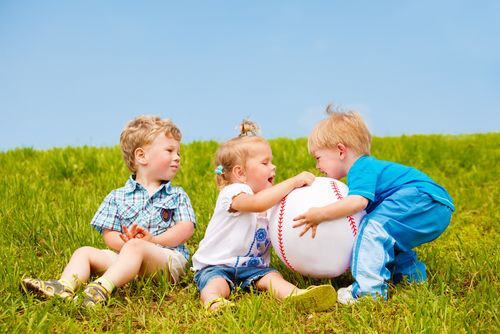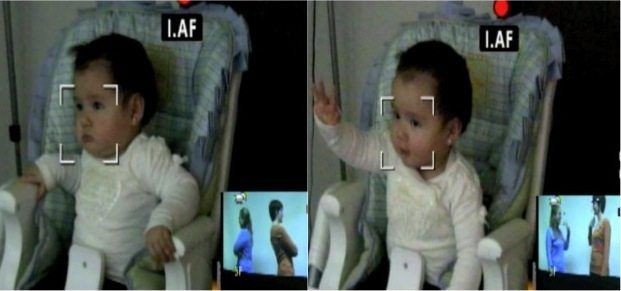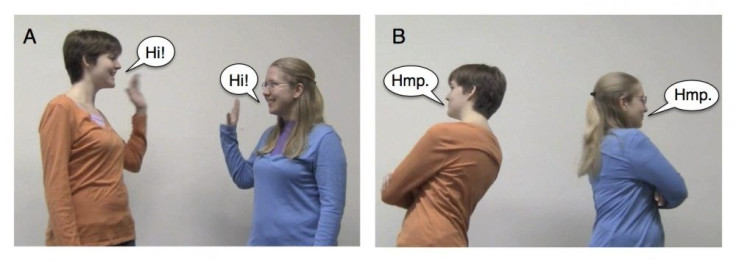Babies Can Tell Friend From Foe At 9 Months: How Infants' Gaze Helps Their Social Cognition

In a matter of seconds, adults can tell apart who is more likely to be a friend or a foe. Overall, shared beliefs, attitudes, and intentions are the basis of what attracts people to one another and establishes some kind of bond. This inherent trait could possibly be traced back to infancy where the development of social cognition begins. According to a recent study, babies show the ability to tell friend from foe as early as 9 months old.
Published in the Journal of Experimental Psychology, a team of researchers at the University of Chicago, investigated whether infants linked food reactions to social relationships by examining how they responded to videos that showed the same adults acting either positively or negatively toward each other.
In the study, 64 9-month-old infants were randomized into either an experimental or control group. During the familiarization process, the participants had to watch a video featuring two adults where one at a time, each actor expressed one positive food evaluation, such as "Ooh. I like that" in a high tone after eating, and a negative food evaluation, “Ew. I don’t like that,” in a low tone after eating. The videos were repeated four times for the infants. The actors also ate from two bowls and then expressed shared or opposing evaluations of the two foods provided.
In the control group, the infants saw the actors express shared evaluations events of the same food and negative evaluation of the other food. Each actor ate twice from her own bowl. The other half of the participants in the experiment group saw opposing evaluations events during which the actors expressed positive and negative evaluations of opposite foods.

“We depicted evaluations of food because food may provide particularly salient social information,” said Katherine D. Kinzler, co-author of the study and the Neubauer Family assistant professor of psychology, according to the news release. “Eating with family and friends is inherently social, and so infants might be particularly inclined to use eating behaviors to make inferences about social relationships.
Following familiarization, the infants viewed six alternating test trials. In positive interaction trials, the actors faced the infant and then turned toward each other, paused briefly, and smiled and waved while saying “Hi!” in a high-pitched voice. In negative interaction trials, the actors faced the infant and then turned toward each other and paused briefly. They then proceeded to turn away from each other, crossing their arms and saying “Hmp” in a low-pitched voice. The infants’ reactions to the videos were measured by observing the amount of time they focused on a still screen at the end of each video.

The findings revealed infants were fixated longer when adults who liked the same foods behaved negatively toward each other. Long gazes were also seen when the adults who disagreed about the foods behaved like friends. These results suggest that babies know that adults who agree with each other tend to act in a friendly way in other situations. The researchers explained the participants predicted adults who reacted similarly to foods were more likely to be friends, but they were surprised when the videos depicted something different.
"This study raises questions on how babies think about who gets along and who doesn't," said Zoe Liberman, lead author and a doctoral student in the University of Chicago Department of Psychology, in the news release. "Parents will be interested to know that babies are keeping track of what's going on in the world around them and are making inferences about social interactions that we previously were not aware of before this study."
Overall, the researchers were surprised to find that babies as early as 9 months old, showed such strong responses to the videos.
In a similar study published in the journal Psychological Science, infants as young as 9 months old were found to condone bullying of those who were “dissimilar” to them. During a puppet show, one puppet demonstrated the same food preference as the infant, while another showed the opposite preference. In the experiments, other puppets harmed, helped, or acted neutrally toward the puppets with different or similar food preferences, according to Medical Xpress. When asked to pick their favorite puppet, infants showed a strong preference for the puppets who harmed the dissimilar puppet and helped the similar one.
These studies both highlight the importance of socialization practices and how basic social preferences may be.
Sources:
Liberman Z, Kinzler KD , Woodward AL. Friends or Foes: Infants Use Shared Evaluations to Infer Others’ Social Relationships. Journal of Experimental Psychology. 2013.
Hamlin JK, Mahajan N, Liberman Z, Wynn K. Not Like Me = Bad: Infants Prefer Those Who Harm Dissimilar Others. Psychological Science. 2013.



























